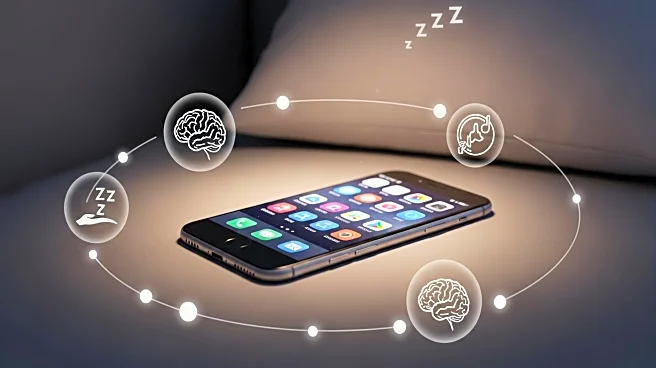What is the story about?
What's Happening?
SleepSpace, an AI-powered sleep technology company, has been awarded a Small Business Innovation Research (SBIR) grant from the National Institute on Aging, part of the National Institutes of Health (NIH). The grant supports the development of a smartphone-based digital therapeutic aimed at treating insomnia and enhancing cognitive health. The initiative, led by Dr. Daniel Gartenberg, PhD, will involve an 11-week randomized controlled trial with 180 older adults experiencing moderate-to-severe insomnia. The study will assess whether the SleepSpace Phone can improve sleep quality and cognitive performance, potentially offering a non-pharmacological alternative to traditional therapies.
Why It's Important?
This development is significant as it represents a shift towards integrating technology with healthcare to address sleep and cognitive issues, particularly in older adults. By potentially improving sleep quality and cognitive function, the SleepSpace initiative could offer a scalable solution to insomnia and related cognitive impairments, such as Mild Cognitive Impairment (MCI) and Alzheimer's Disease. The project also highlights the potential of digital therapeutics to provide non-drug alternatives, which could reduce dependency on medication and its associated side effects. This could have broad implications for public health, particularly in aging populations.
What's Next?
The upcoming trial will be crucial in determining the efficacy of the SleepSpace Phone as a therapeutic tool. If successful, it could pave the way for broader adoption of digital therapeutics in mental healthcare. The results could influence healthcare policies and encourage further investment in similar technologies. Stakeholders, including healthcare providers and policymakers, will likely monitor the trial's outcomes to assess the potential integration of such technologies into standard care practices.
Beyond the Headlines
The SleepSpace initiative also raises questions about the role of technology in healthcare, particularly concerning privacy and data security. As digital therapeutics become more prevalent, ensuring the protection of sensitive health data will be paramount. Additionally, the project underscores the need to balance technological innovation with ethical considerations, such as the potential for increased screen time and its impact on mental health.
















